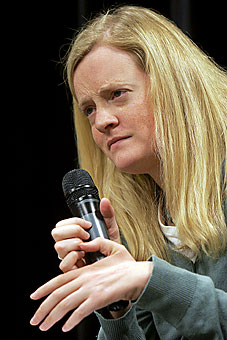 |
|
JACOB KONST/Arizona Daily Wildcat
|
Fine arts graduate student Katie Samson discusses the ethical issues pertaining to assisted suicide with the audience yesterday in Gallagher Theater. Samson is concerned that the film "The Sea Inside" might give the impression that disabled individuals are all suicidal.
|
|
|
By Djamila Noelle Grossman
Arizona Daily Wildcat
Wednesday, April 13, 2005
Print this
A screening of the Spanish movie "The Sea Inside" was held at the Gallagher Theater yesterday to encourage dialogue between disabled and non-disabled people, organizers said.
The movie intended to show the true story of Ramon Sampedro, a Spanish fisherman who, because of an accident, spent 28 years of his life paralyzed and bedridden.
Even though Sampedro taught everyone around him to appreciate life, he desperately wanted to end his own.
Two women who fell in love with Sampedro and helped him commit suicide explained the issues people in close relationships encounter when a friend wants to die.
A panel discussion after the movie addressed problems and controversies, but also positive aspects evoked by the topic.
Panel member Ron Rudd, a pastor at the Campus Christian Center, said one thing to consider is that Sampedro's life also affected other people.
"Our lives are not just our own, they also belong to God and the community," Rodd said.
Katie Samson, a fine arts graduate student and panel member, said the movie might give non-disabled people the impression that all disabled people want to end their lives.
Samson, who is disabled, said this is not the case because the majority of disabled people enjoy their lives.
Other questions included the consequences of assisted suicide, the slippery slope of society getting used to it and the role of the law.
Even though the movie did not directly solve the controversy, it enhanced dialogue and thoughts on the topic, which is equally important, said Cori Geier, an undeclared sophomore.
She did not take a stance on the movie, Geier said, because it was not made to offer a resolution, but rather to, "put bold questions on the surface, that you would normally not ask."
David Corsi, disability specialist at the Disability Resource Center, said he thought the event was a success because disabled and non-disabled people started to interact, which might clear off some of the misconceptions and fears both sides have of each other.
"I think it's a step in the right direction. Instead of two camps fighting each other, we can talk, because many of the barriers are a misconception," Corsi said.
The goal to put forward a dialogue between disabled and non-disabled people has been in discussion since January and the movie was only one part of a series, Corsi said.
